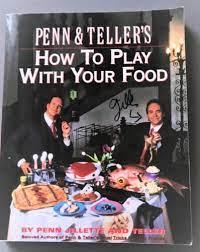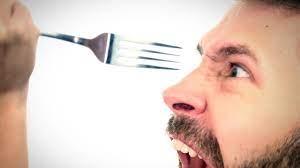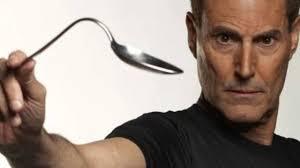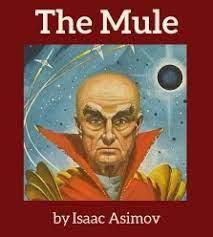
Who could resist that book title found at a yard sale? More, the authors were Penn & Teller — renowned magicians and outspoken advocates for reason against superstition.
We’ve all been scolded, “Don’t play with your food.” Well, food is good to eat, but also fun to play with. Where’s the problem? As the saying goes, you can have your cake (to play with) and eat it too. No?

The book is a how-to guide for tricks involving food. Like pretending to stab your eye with a fork, making a flood of white gunk spew out. Shock your dinner companions.
Most are fairly simple tricks involving sleight of hand and misdirection — or, as the authors put it, “lying.” Lying is wrong as a general moral principle, but only if you owe the lyee the truth. You don’t owe the Gestapo the truth about Jews in your attic. Penn and Teller would have excelled at that game.
And they do have moral scruples. One chapter is “How to Get Your Ethical-Vegetarian Friends to Eat Veal.” The “trick” is simple and obvious. But then they say don’t do it — it would be wrong.

Not everything in the book involves magic, exactly. Penn relates an encounter with non-aesthete truckers at a Nebraska eatery, menacingly picking a fight with him. He lifted his milkshake and poured it over his own head. That so confuzzled the truckers that they backed off and skedaddled. A food trick, I guess. Handy to know.
While magic is mostly fun and entertainment, the authors take a dim view of frauds who actually purport to be on the level. Like with spoon bending and other paranormal nonsense. They observe that if any such were really possible, then it wouldn’t be “paranormal.” So too with “supernatural;” anything real is natural.

There’s a nod to James (“the Amazing”) Randi who tirelessly exposed frauds like spoon bender Uri Geller. And Penn and Teller make this killer point: if someone actually had the kind of mental powers that could bend spoons — why waste them bending spoons?! Likewise regarding “psychics” — why are they hustling suckers for chump change when their abilities (if real) should easily make them rich?

I was reminded of Isaac Asimov’s “Foundation” trilogy. One character, “The Mule,” was a rare mutant who really and truly could read minds. So he wound up ruling the galaxy.
Penn and Teller are merciless against all irrational beliefs. One chapter is headed “Salt in the Wounds of Credulous Fools.” A side box highlights “How many times can we say ‘extraordinary claims require extraordinary evidence,’ ‘you can’t prove a negative,'” and several other truisms of rationality.

The food trick here involves using what’s actually mere table salt to “cure” a fake blister, calling it a “homeopathic” remedy, conning homeopathic suckers to buy some. (Salt couldn’t actually qualify as “homeopathic” which, the authors do correctly note, means there’s nothing in it except plain water; but never mind.) They end here with “make sure you tell them it cures herpes.” Adding, “we are the lowest of the low.”
